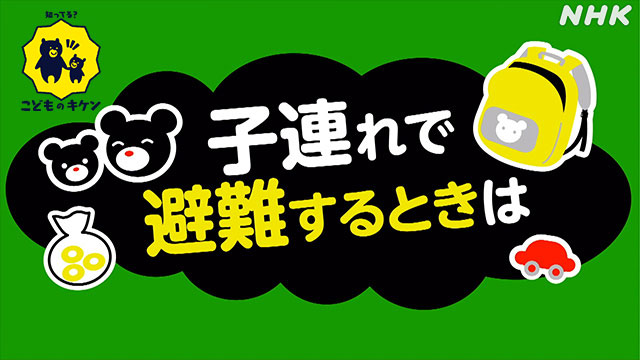When a typhoon is about to come.
When heavy rain is forecast.
Having small children can make you feel anxious.
When should I evacuate? Where to escape?
We asked Project Associate Professor Naoko Kisaku of the Nagoya University Disaster Mitigation Research Center, who is herself a mother of a 0-year-old child and an expert in disaster prevention, about the key points of evacuating with children.
(Osaka Broadcasting Station Reporter Fumi Nakamoto)
Evacuation by "evacuation of the elderly"
The first thing I heard was the timing of the evacuation.
If you are traveling with small children, when should you evacuate?
Mr. Kisaku concludes:
"When a municipality evacuates the elderly, etc."
In the event of a disaster, various evacuation information will be issued from municipalities.
Rather than "evacuation orders" where the danger is more imminent, "evacuation of the elderly" is issued at an earlier stage.
It calls on people who take a long time to evacuate as soon as possible.
Infants are also included in the elderly "etc."
It's true that it takes time to act with children.
Usually, just before going out, I say, "I'm going to the bathroom" or "I don't want to go out."
In the event of a disaster, the passage of time can be dangerous.
And walking in heavy rain with a child who is reluctant and violent and in poor footsteps and visibility increases the risk of disaster.
(Project Associate Professor Naoko Kisaku, Nagoya University) "It takes time to evacuate with children,
so please evacuate as soon as possible when the "evacuation of the elderly, etc." occurs. When it rains or thunder enough to scare children, it's too late to evacuate. In that case, please consider switching to home evacuation and move to a safer place, such as the upper floor."
In order to obtain evacuation information issued by municipalities, it is convenient to set notification settings in the "NHK News / Disaster Prevention" app or the weather app.
Strollers are not allowed for movement
And do not use a stroller when moving.
Let's use a dakko-string.
Lie in front of your body, not your butt.
It will be easier to protect the child's head.
As for shoes, both parents and children wear their usual shoes.
It will be difficult to walk in boots.
Where to evacuate? Acquaintance's house, hotel, and overnight stay in the car
Where you evacuate is also important.
Are you hesitant to go to an evacuation center if you have children?
There is also a feeling that you are shy away from "I'm going to cause trouble" or "I'm tired of the people around me".
In the meantime, evacuation will be delayed and the risk will increase.
Kisaku says, "Evacuation destinations are not limited to evacuation centers designated by local governments."
Please consider acquaintances' homes, hotels, and overnight stays in the car as an option, and think about where to evacuate in advance.
At this time, be sure to check the "hazard map".
You can see whether each place is vulnerable to landslides, floods, or floods.
If your home seems to be okay, you can consider evacuating at home, or consider staying at an acquaintance's house or car in a safe area.
However, Kisaku says that there are merits to designated evacuation centers by local governments.
(Project Associate Professor Naoko Kisaku, Nagoya University) "If you go to a designated evacuation center, it will be easier to obtain relief supplies such as diapers and milk,
and an increasing number of local governments are setting up 'welfare shelters' that take care to guide infants to different rooms. If it is in the area, please consider using it."
Take photos in case you get lost
When it comes time to evacuate, please expect to be separated from your children.
Give your child an identifying note with their name and parent's contact information.
In addition, photos are surprisingly useful.
If you take a picture of your child with your parent's smartphone before evacuating, you can tell people about their clothes and characteristics at a glance, making it easier to find.
A little imagination in between everyday life
It is important to be prepared for disaster prevention measures on a regular basis.
There must be many people who know but are putting it off.
If you have small children, you will be overwhelmed by the busyness of your daily life.
Kisaku advises that even a little awareness in between daily life can be useful in an emergency.
(Specially Appointed Associate Professor Naoko Kisaku, Nagoya University)
"As a mother of an infant, I find it very difficult to evacuate with my child, but for example, I think about what I would do if it rained heavily while I was picking up and dropping off a nursery school. This also leads to disaster prevention. Please keep thinking about the moment in the back of your mind."
When you can, do what you can, little by little.
Through such accumulation, I would like to protect young lives even in an emergency.

